I
didn't learn until two days ago, six decades after watching the movie
adaptation of Anatomy
of a Murder
with
my parents, that "Robert Traver" based his novel on a real
murder case and that he had been the defense attorney in that case. I
vaguely recall comments to that effect by my lawyer father. If so
he'd have gotten it from newspaper accounts, as there's no mention of
it in the movie or in the novel. My memory on this is cautious
because I also believed my father had said the author, whose real
name was John D. Voelker, a Michigan Supreme Court Justice when he
wrote the novel, had played the judge in the movie.
'Tweren't so. The
man playing the judge was vastly more important historically than a
hundred Judge Voelkers or even a hundred Jimmy Stewarts, the actor
who brilliantly portrayed Voelker's real-life trial role in the
movie. I sit chagrined now by this flawed memory, as Dad, who spent
the years I knew him deriding "McCarthyism" whenever he saw
so much as a hair from its ugly head, would never have mistaken a
mere state supreme court justice for Joseph N. Welch, the Boston
attorney who five years earlier called the Wisconsin demagogue's
bluff in the Army-McCarthy hearings with this single line, which I do
remember hearing live on the radio at the time but without remotely
comprehending its thunderous significance:
"Have you no sense of decency, sir, at long last?"
Although
I’ve thought of that movie often over the years, I never read the
book—until last week. It’s a long’n at 437 pages, yet, despite
length and wordiness, it pulled me through with a relentless force.
As is often the case for me, voice has a lot to do with how I take to
a novel. With Anatomy
of a Murder I
found myself astounded by the unmistakable, ingenuous, unashamedly
corny voice of Jimmy Stewart! Want a sample? Here’s the novel’s
narrator, Paul Biegler, lamenting the loss of his job as county
prosecutor to a young Korean War veteran (Biegler was 4F), and
wondering what he should do with the rest of his life:
“For
a spell I even dabbled with the heady notion of organizing a sort of
American legion of 4F’s. We’d have an annual convention and
boyishly tip over buses and streetcars and get ourselves a national
commander who could bray in high C and sound off on everything under
the sun; we’d even get a lobby in Washington and wave the Flag and
praise the Lord and damn the United Nations and periodically swarm
out like locusts selling crepe-paper flowers or raffle tickets or
some damned thing, just like all the other outfits.”
J-J-James
Shtowert, no? Anyway, I heard him in there, all the way. It was
Stewart I remembered most from movie, notwithstanding Lee Remick’s
skintight
slitherings
and come hitherings and enrapturing smile and eyes and...things. And
the scene I remembered most fondly, and which almost seduced me into
taking up trout fishing and smoking Italian cheroots, was the opening
scene:
Duke Ellington’s saucy jazz riffs accompanying a tiny convertible
in Michigan’s Upper Peninsula zipping along a winding road until
the car’s in front of us and we see it’s Stewart driving and it’s
early morning and he slows down through the little town and waves and
speaks to a shopkeeper and finally arrives home and stashes his
freshly caught trout in the fridge with several dozen other trout,
each wrapped in newspaper, stows his fishing gear in a sort of
hallway/closet and then…
I’ve
played that scene in my mind over and over again over the decades,
and it always faded out with me playing the Jimmy Stewart part. But I
never studied law or learned to fish with a fly. But last week, for
no particular reason save perhaps some sort of irresistible impulse,
I bought the DVD and played the movie once again. Alas, to my
heartsick disappointment the opening had shrunk over the years. The
convertible now is already entering the town instead of winding along
through the countryside—a scene I’m now thinking was in the
theatrical version I saw but was cut in later editions to pare down
the time of this still quite long—about two hours—fictional
dramatization of a real trial that successfully tested a 19th
century Michigan Supreme Court ruling that affirmed
the concept of dissociative reaction, aka “irresistible impulse,”
as a legitimate insanity defense. It established Michigan as one of
only a few states to recognize this defense as valid, legally
exonerating someone who, whether or not able to distinguish between
right and wrong at the time, simply cannot resist committing the
crime.
Both
cases—the real and the fictitious—involved a military man
shooting to death the proprietor of an inn after the proprietor raped
the soldier’s wife. Both defendants were tried by jury, and both
juries rendered the same verdict. The two main difficulties Anatomy’s
defense face are to convince the jury that the victim did in fact
rape the defendant’s wife and that her husband was in such a mental
state after seeing what had happened to her that he marched straight
from the couple’s trailer to the inn and emptied his war trophy
German Lüger
into the rapist. Complicating both requirements are the stunning
beauty of the wife and the jealous nature of her soldier husband,
both of which could be seen in the couple’s courtroom demeanor. In
the movie, the wife, played by Lee Remick, made this more difficult
for her husband by flaunting her flirtatiousness around the small
town where the trial was being held. The wife is more restrained in
the novel, but still comes across as strikingly attractive. Here’s
Biegler, her husband’s, lawyer, describing his reaction to meeting
her:
“I
caught my breath. Her eyes were large and a sort of luminous aquarium
green. Looking into them was like peering into the depths of the sea.
I had never seen anything quite like them before and I was beginning,
however dimly, to understand a little what it was that might have
driven Barney Quill off his rocker. The woman was breathtakingly
attractive, disturbingly so, in a sort of vibrant electric way. Her
femaleness was blatant to the point of flamboyance; there was
something steamily tropical about her; she was, there was no other
word for it, shockingly desirable.”
Yet,
more engrossing than the drama these primal dynamics bring to
Anatomy,
the novel takes us into a world seldom seen in such depth and
intimacy by the average citizen, that of trial by jury. Even Biegler
is amazed to realize in the heat of this courtroom battle the
contest’s ultimate vitality. “A
grim thought suddenly assailed me,” he tells us. “Though I had
never held many illusions to the contrary, I was now struck solidly
in the gut with the notion of what a snarling jungle a trial really
was; with the fact that despite all the obeisant “Your honors”
and “may it please the courts,” despite all the rules and
objections and soft illusion of decorum, a trial was after all a
savage and primitive battle for survival itself.”
Of
Biegler’s love for this high-stakes arena there is no doubt. He
compares the practice
of law with prostitution, “one of the last of the unpredictable
professions—both employ the seductive arts, both try to display
their wares to the best advantage, and both must pretend
enthusiastically to woo total strangers.”
And
of a murder trial? “A lawyer caught in the toils of a murder case
is like a man newly fallen in love:
his involvement is total. All he can think about, talk about, brood
about, dream about, is his case, his lovely lousy goddam case.
Whether fishing, shaving, even lying up with a dame, it is always
there, the pulsing eternal insistent thump thump of his case. Alas,
it is true: the lover in love and the lawyer in murder share equally
one of the most exquisite, baffling, delightful, frustrating,
exhilarating, fatiguing, intriguing experiences known to man.” A
lot like writing a novel, author Voelker might have added.
As
to the movie’s opening scene...the one I’d held in my memory
since 1959 of the aerial view of the convertible flying along the
winding road, and the saucy jazz, I began to wonder if maybe my
imagination had gotten involved a tad too much in there. If so, I’d
have to admit to being an unreliable witness, and would be wary of
inflicting my memory on anyone who might find his or her life or
freedom on trial by a jury. I figured if the scene had been cut in
the DVD version I watched two days ago maybe I’d find it in the
book. And were that so, I would be exonerated. Sadly, this was not to
be. Here’s the opening, wonderful as it is, but not what I needed
to restore my confidence. If you have a Duke Ellington CD handy, for
Pete’s sake (as Jimmy might have put it) put it on:
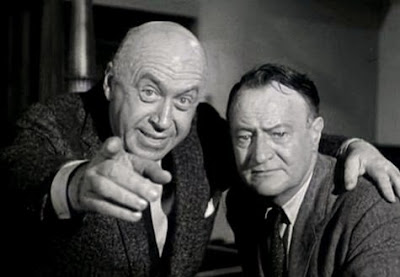 |
| Otto Preminger and John D. "Robert Traver" Voelker |
“The
mine whistles were tooting midnight as I drove down Main Street hill.
It was a warm moonlit Sunday night in mid-August and I was arriving
home from a long weekend of trout fishing in the Oxbow Lake district
with my old hermit friend Danny McGinnis, who lives there all year
round. I swung over on Hematite Street to look at my mother’s
house— the same gaunt white frame house on the corner where I was
born. As my car turned the corner the headlights swept the rows of
tall drooping elms planted by my father when he was a young man—
much younger than I— and gleamed bluely on the darkened windows. My
mother Belle was still away visiting my married sister and she had
enjoined me to keep an eye on the place. Well, I had looked and lo!
like the flag, the old house was still there.
“I
swung around downtown and slowed down to miss a solitary drunk
emerging blindly from the Tripoli Bar and out upon the street, in a
sort of gangling somnambulistic trot, pursued on his way by the
hollow roar of a juke box from the garishly lit and empty bar.
“Sunstroke,” I murmured absently. “Simply a crazed victim of
the midnight sun.” As I parked my mud-spattered coupe alongside the
Miners’ State Bank, across from my office over the dime store, I
reflected that there were few more forlorn and lonely sounds in the
world than the midnight wail of a juke box in a deserted small town,
those raucous proclamations of joy and fun where, instead, there
dwelt only fatigue and hangover and boredom. To me the wavering hoot
of an owl sounds utterly gay by comparison.
“I
unlocked the car trunk and took out my packsack and two
aluminum-cased fly rods and a handbag and rested them on the curb. I
shouldered the packsack and grabbed up the other stuff and started
across the echoing empty street.”
[For
more Friday's Forgotten Books check the links on Patti
Abbott's unforgettable blog]
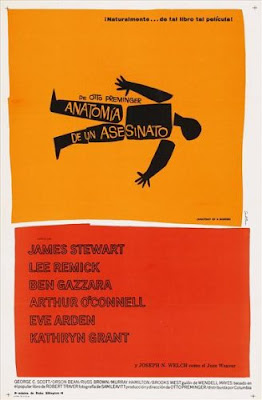
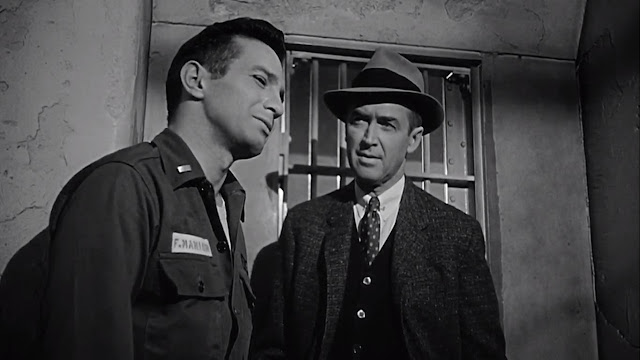
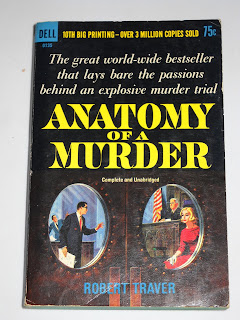
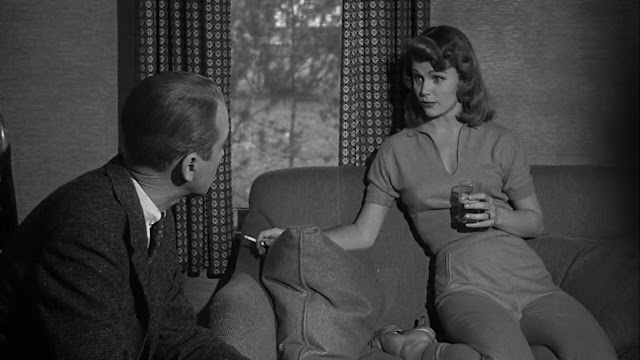
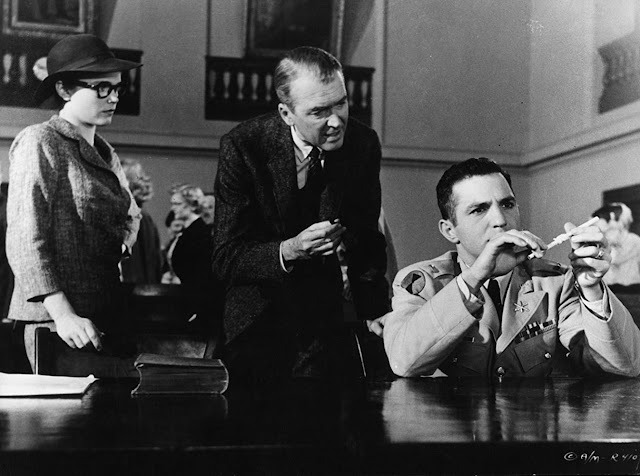
I’ve owned a paperback of this book for years, but never read it. I’ve seen the film several times and I consider it a great movie with a great cast.
ReplyDeleteI found the book at least a third longer than it had to be, Elgin. Still well worth the time. Really gets into the nuts and bolts of a murder trial.
DeleteI also have had a paperback copy of this book for years and not read it yet. I am going to go see if it is the same one pictured here. But I haven't seen the movie either. Maybe the length of the book has been deterring me, but I should read it anyway.
ReplyDeleteI think this is one book/movie combo where seeing the movie first might be the best way to approach the novel, Tracy. It was for me. The movie takes enough liberties with the book's plot that there will be surprises there, as well.
Delete